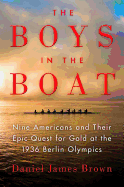
The triumphant moment at the 1936 Berlin Olympics when the eight rowers and one coxswain in the Husky Clipper won the gold medal for the United States in the eight-oared crew race has not only gone down in Olympic record books but also is captured in the glorious rowing sequences in Leni Riefenstahl's Olympia, one of the greatest films about athletic competitions.
To some--including Adolf Hitler, who watched that race from the viewing platform at Langer See regatta grounds in Grünau--the University of Washington crew representing the United States had scored an upset. To Al Ulbrickson, the Washington rowing coach, the victory was not entirely a surprise, although Ulbrickson, nicknamed "The Dour Dane" for his extreme reticence, was not a guy to risk jinxing a race by even thinking a win might be a sure thing.
Ulbrickson may not have been talkative, but he was fiercely competitive; for years he had been obsessed with the winning record of Ky Ebright, head coach at the University of California, Berkeley, Ulbrickson's arch rival. Ebright had led his crews to Olympic gold medals in 1928 and 1932. Ulbrickson was determined to develop rowers who would best those Ebright coached at Berkeley. And in April 1933 his obsession finally paid off when the University of Washington crews swept the annual Pacific Regatta.
Those 1933 wins emboldened Ulbrickson and Tom Bolles, his freshman rowing coach, to launch an intensive drive to find and train a crew that could capture Olympic Gold in the 1936 Games. Bolles and Ulbrickson knew the qualities they were looking for: potential for raw power, stamina, willpower, the intelligence to master rowing technique and the ability to drop all traces of personal ego once seated in the boat--even if these new recruits had never before rowed a boat. As George Pocock, who built the Husky Clipper and so many other prize racing shells, said, "What matters more than how hard a man rows is how well everything he does in the boat harmonizes with what the other fellows are doing."
In the fall of 1933, a new crop of rowing candidates arrived on the Seattle campus. One of those was Joe Rantz. Strong, disciplined, earnest and determined to break free of a childhood history of poverty and abandonment, Rantz saw making the rowing team as one of the ways to fund college—not because there was anything like athletic scholarships back then but because being on the crew meant he was eligible for part-time jobs on campus. Rantz was almost made to order for his coaches' requirements. The other rowers who trained with Rantz filled the bill just as he did.
To make the crew and stay on the roster was hard work, with mandatory daily workouts and intense competition for a rowing position. And, like most coaches in 1933, Tom Bolles and Al Ulbrickson were the undisputed bosses with a strictly business attitude, constantly monitoring the performance of their rowers.
Daniel James Brown's enthralling history of the run-up to the 1936 Olympic victory shows in vivid detail the many factors, including Ulbrickson's strategy for keeping his rowers on edge and hungry, that had to come together between 1933 to 1936 so that the Husky Clipper and its crew would be first to cross the finish line at Berlin's Langer See regatta course.
With nail-biting suspense, Brown shows how each of the seven key qualifying races before the Berlin Olympics was hard fought. Victories were not only the result of skill, dedication, planning, teamwork and strategy, but also the weather conditions on specific courses--the races on Seattle's Lake Washington, the Oakland Estuary near Berkeley and the Hudson River at Poughkeepsie for the annual Intercollegiate Rowing Association Regatta. With calm assurance and telling detail, Brown establishes that rare, thrilling you-are-there quality that epitomizes the best in sports writing.
What's more, Brown's storytelling captures the personalities and psychologies of all the players, from the behind-the-scenes boat builder and rowing guru George Pocock to the brilliant and self-assured coxswain Bobby Moch, the shortest man in the boat. Brown completes his complex portrait of Al Ulbrickson with the coach's statement to United Press International, after the Olympic victory was safely in hand, finally allowing himself to say what he could never say before: the crew was "the finest I ever saw seated in a shell. And I've seen some corking boatloads."
Brown eloquently sums up all that he's shown us contributing to that amazing Olympic victory in Berlin: "Everything had converged: the right oarsmen, with the right attitudes, the right personalities, the right skills; the perfect boat, sleek, balanced, and wickedly fast; a winning strategy at both long and short distances; a coxswain with the guts and smarts to make hard decisions and make them fast." --John McFarland

